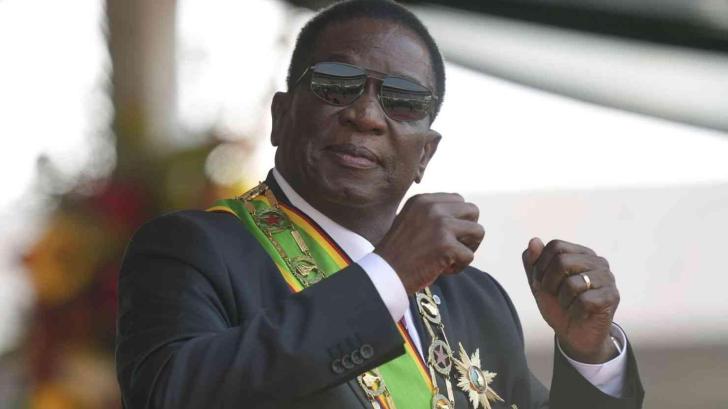News / National
Mnangagwa lauds land reform programme beneficiaries
08 Nov 2024 at 07:07hrs |
0 Views

President Emmerson Mnangagwa has commended Zimbabwean farmers who benefitted from the country's controversial land reform programme, highlighting their success in transforming farming into business ventures that contribute to sustainable livelihoods and economic growth.
Addressing Zimbabwean ambassadors from across the globe during a meeting on Tuesday, Mnangagwa reiterated the government's commitment to the land reform programme, describing it as "irreversible" and integral to the nation's agricultural strategy. He emphasized the noticeable shift among farmers, particularly those who received land under the reform, toward treating farming as a business.
"It is commendable that there is a noticeable shift among Zimbabwean farmers, particularly among beneficiaries of the land reform, who are increasingly treating farming as a business," Mnangagwa said. "This is resulting in sustainable livelihoods, while enhancing household incomes and economic value."
The president cited the impressive achievements in tobacco and wheat production, which have contributed significantly to Zimbabwe's foreign currency generation, as a key indicator of the land reform's success. These developments are seen as pivotal to the country's economic recovery and growth, despite ongoing challenges.
During the same meeting, Mnangagwa also took the opportunity to highlight Zimbabwe's current chairmanship of the Southern African Development Community (SADC), which he sees as an important platform for advancing regional economic initiatives.
"This is a crucial time for Zimbabwe to lead regional efforts, particularly those aimed at fostering economic growth and development in Southern Africa," he said. "I expect our diplomats to embody the resilience and action-oriented spirit of the Zimbabwean people in their missions."
Mnangagwa called on the ambassadors to proactively promote Zimbabwe's image on the international stage, correcting misconceptions, particularly those surrounding the impact of international sanctions on the country. He urged the diplomats to engage with Zimbabwe's diaspora community and strengthen trade relations to contribute to national development.
On the issue of corruption, Zimbabwe Anti-Corruption Commission (ZACC) commissioner Michael Reza also addressed the meeting, highlighting the country's struggle to obtain international cooperation in investigating and recovering assets hidden in foreign jurisdictions. Reza called on Zimbabwe's ambassadors to use their diplomatic influence to secure Mutual Legal Assistance agreements that would aid in the prosecution of offenders and recovery of the proceeds of crime.
"The fight against corruption is a global battle that requires international cooperation and a united front," Reza said, urging the ambassadors to advocate for stronger cross-border cooperation to combat corruption.
As Zimbabwe grapples with both domestic challenges and international isolation, the government continues to push for policies that promote agricultural growth, economic development, and enhanced diplomatic relations. With the land reform programme viewed as a cornerstone of this strategy, Mnangagwa's praise for the successes of the farmers reflects the government's desire to highlight positive outcomes despite ongoing criticism of the programme's execution and impact.
Addressing Zimbabwean ambassadors from across the globe during a meeting on Tuesday, Mnangagwa reiterated the government's commitment to the land reform programme, describing it as "irreversible" and integral to the nation's agricultural strategy. He emphasized the noticeable shift among farmers, particularly those who received land under the reform, toward treating farming as a business.
"It is commendable that there is a noticeable shift among Zimbabwean farmers, particularly among beneficiaries of the land reform, who are increasingly treating farming as a business," Mnangagwa said. "This is resulting in sustainable livelihoods, while enhancing household incomes and economic value."
The president cited the impressive achievements in tobacco and wheat production, which have contributed significantly to Zimbabwe's foreign currency generation, as a key indicator of the land reform's success. These developments are seen as pivotal to the country's economic recovery and growth, despite ongoing challenges.
During the same meeting, Mnangagwa also took the opportunity to highlight Zimbabwe's current chairmanship of the Southern African Development Community (SADC), which he sees as an important platform for advancing regional economic initiatives.
Mnangagwa called on the ambassadors to proactively promote Zimbabwe's image on the international stage, correcting misconceptions, particularly those surrounding the impact of international sanctions on the country. He urged the diplomats to engage with Zimbabwe's diaspora community and strengthen trade relations to contribute to national development.
On the issue of corruption, Zimbabwe Anti-Corruption Commission (ZACC) commissioner Michael Reza also addressed the meeting, highlighting the country's struggle to obtain international cooperation in investigating and recovering assets hidden in foreign jurisdictions. Reza called on Zimbabwe's ambassadors to use their diplomatic influence to secure Mutual Legal Assistance agreements that would aid in the prosecution of offenders and recovery of the proceeds of crime.
"The fight against corruption is a global battle that requires international cooperation and a united front," Reza said, urging the ambassadors to advocate for stronger cross-border cooperation to combat corruption.
As Zimbabwe grapples with both domestic challenges and international isolation, the government continues to push for policies that promote agricultural growth, economic development, and enhanced diplomatic relations. With the land reform programme viewed as a cornerstone of this strategy, Mnangagwa's praise for the successes of the farmers reflects the government's desire to highlight positive outcomes despite ongoing criticism of the programme's execution and impact.
Source - newsday
Join the discussion
Loading comments…
































